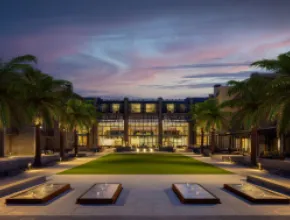It's no accident that China, the new global economic powerhouse, is using the 2008 Summer Games to show the world that it can get things done on a truly Olympic scale. Whole sections of the city are being shuffled around like so many pieces of a jigsaw puzzle to make room for new stadiums, hotels and freeways.
Earlier this month, Beijing Capital International Airport inaugurated a third airport terminal, the main element of an ongoing expansion project. The project, with the aim of overall completion in 2015, is expected to allow the airport to handle a total of 76 million passengers annually with 500,000 flights.
The project has already expanded the airport's total footprint by 60 percent and added a new runway that can handle the world's largest passenger aircraft, the Airbus A380.
When it comes to the new high-speed rail system that will link Beijing to nearby co-host cities, the numbers are staggering. In April the government will put 280 high-speed bullet trains into operation—with a few hundred more expected to start service before the games begin. Thanks to the new bullet trains, authorities say that the travel time between many of the country's major cities will be cut in half.
When it comes to the roads, a traffic network of four concentric beltways, 28 radial roads, and underground and suburban railways are being developed to link the city center with outlying areas and surrounding towns. Not all of these projects will be done in time for the Olympics, but a modernized road system bodes well for future meetings and conventions in Beijing.
Hoteliers have been adding Beijing properties as fast as possible over the last few years, and a new hotel seems to open every week or so. One of the most notable openings was last month's 305-room The Ritz-Carlton, Beijing. The group-friendly property has more than 14,000 square feet of meeting and special event space. The hotel is centrally situated in one of Beijing's most-fashionable areas, and is near a soon-to-open JW Marriott property.
Last but not least, when the Games are over Beijing tourism officials say that the Olympic Park area will be one of the biggest and most comprehensive mixed-use areas—complete with hotels, convention space, restaurants, and shopping-- that the world has ever seen.
While what transpires in August will be the final indicator just how well China's capital rose to its Olympic task, one thing is certain—Beijing is thinking big.





